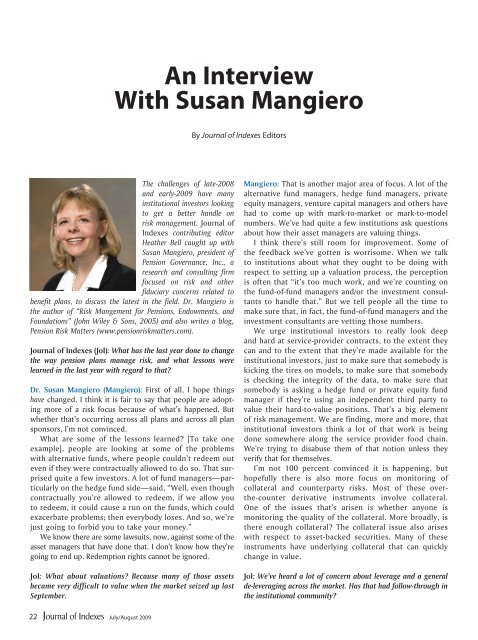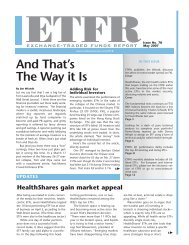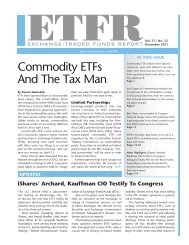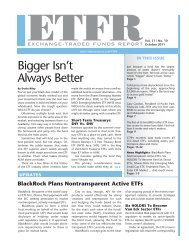How to Kill a Black Swan Remy Briand and David Owyong ...
How to Kill a Black Swan Remy Briand and David Owyong ...
How to Kill a Black Swan Remy Briand and David Owyong ...
Create successful ePaper yourself
Turn your PDF publications into a flip-book with our unique Google optimized e-Paper software.
An Interview<br />
With Susan Mangiero<br />
By Journal of Indexes Edi<strong>to</strong>rs<br />
The challenges of late-2008<br />
<strong>and</strong> early-2009 have many<br />
institutional inves<strong>to</strong>rs looking<br />
<strong>to</strong> get a better h<strong>and</strong>le on<br />
risk management. Journal of<br />
Indexes contributing edi<strong>to</strong>r<br />
Heather Bell caught up with<br />
Susan Mangiero, president of<br />
Pension Governance, Inc., a<br />
research <strong>and</strong> consulting firm<br />
focused on risk <strong>and</strong> other<br />
fiduciary concerns related <strong>to</strong><br />
benefit plans, <strong>to</strong> discuss the latest in the field. Dr. Mangiero is<br />
the author of “Risk Mangement for Pensions, Endowments, <strong>and</strong><br />
Foundations” (John Wiley & Sons, 2005) <strong>and</strong> also writes a blog,<br />
Pension Risk Matters (www.pensionriskmatters.com).<br />
Journal of Indexes (JoI): What has the last year done <strong>to</strong> change<br />
the way pension plans manage risk, <strong>and</strong> what lessons were<br />
learned in the last year with regard <strong>to</strong> that?<br />
Dr. Susan Mangiero (Mangiero): First of all, I hope things<br />
have changed. I think it is fair <strong>to</strong> say that people are adopting<br />
more of a risk focus because of what’s happened. But<br />
whether that’s occurring across all plans <strong>and</strong> across all plan<br />
sponsors, I’m not convinced.<br />
What are some of the lessons learned? [To take one<br />
example], people are looking at some of the problems<br />
with alternative funds, where people couldn’t redeem out<br />
even if they were contractually allowed <strong>to</strong> do so. That surprised<br />
quite a few inves<strong>to</strong>rs. A lot of fund managers—particularly<br />
on the hedge fund side—said, “Well, even though<br />
contractually you’re allowed <strong>to</strong> redeem, if we allow you<br />
<strong>to</strong> redeem, it could cause a run on the funds, which could<br />
exacerbate problems; then everybody loses. And so, we’re<br />
just going <strong>to</strong> forbid you <strong>to</strong> take your money.”<br />
We know there are some lawsuits, now, against some of the<br />
asset managers that have done that. I don’t know how they’re<br />
going <strong>to</strong> end up. Redemption rights cannot be ignored.<br />
JoI: What about valuations? Because many of those assets<br />
became very difficult <strong>to</strong> value when the market seized up last<br />
September.<br />
Mangiero: That is another major area of focus. A lot of the<br />
alternative fund managers, hedge fund managers, private<br />
equity managers, venture capital managers <strong>and</strong> others have<br />
had <strong>to</strong> come up with mark-<strong>to</strong>-market or mark-<strong>to</strong>-model<br />
numbers. We’ve had quite a few institutions ask questions<br />
about how their asset managers are valuing things.<br />
I think there’s still room for improvement. Some of<br />
the feedback we’ve gotten is worrisome. When we talk<br />
<strong>to</strong> institutions about what they ought <strong>to</strong> be doing with<br />
respect <strong>to</strong> setting up a valuation process, the perception<br />
is often that “it’s <strong>to</strong>o much work, <strong>and</strong> we’re counting on<br />
the fund-of-fund managers <strong>and</strong>/or the investment consultants<br />
<strong>to</strong> h<strong>and</strong>le that.” But we tell people all the time <strong>to</strong><br />
make sure that, in fact, the fund-of-fund managers <strong>and</strong> the<br />
investment consultants are vetting those numbers.<br />
We urge institutional inves<strong>to</strong>rs <strong>to</strong> really look deep<br />
<strong>and</strong> hard at service-provider contracts, <strong>to</strong> the extent they<br />
can <strong>and</strong> <strong>to</strong> the extent that they’re made available for the<br />
institutional inves<strong>to</strong>rs, just <strong>to</strong> make sure that somebody is<br />
kicking the tires on models, <strong>to</strong> make sure that somebody<br />
is checking the integrity of the data, <strong>to</strong> make sure that<br />
somebody is asking a hedge fund or private equity fund<br />
manager if they’re using an independent third party <strong>to</strong><br />
value their hard-<strong>to</strong>-value positions. That’s a big element<br />
of risk management. We are finding, more <strong>and</strong> more, that<br />
institutional inves<strong>to</strong>rs think a lot of that work is being<br />
done somewhere along the service provider food chain.<br />
We’re trying <strong>to</strong> disabuse them of that notion unless they<br />
verify that for themselves.<br />
I’m not 100 percent convinced it is happening, but<br />
hopefully there is also more focus on moni<strong>to</strong>ring of<br />
collateral <strong>and</strong> counterparty risks. Most of these overthe-counter<br />
derivative instruments involve collateral.<br />
One of the issues that’s arisen is whether anyone is<br />
moni<strong>to</strong>ring the quality of the collateral. More broadly, is<br />
there enough collateral? The collateral issue also arises<br />
with respect <strong>to</strong> asset-backed securities. Many of these<br />
instruments have underlying collateral that can quickly<br />
change in value.<br />
JoI: We’ve heard a lot of concern about leverage <strong>and</strong> a general<br />
de-leveraging across the market. Has that had follow-through in<br />
the institutional community?<br />
22<br />
July/August 2009
















